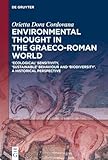Environmental Thought in the Graeco-Roman World : ‘Ecological’ Sensitivity, ‘Sustainable’ Behaviour and ‘Biodiversity’. A Historical Perspective / Orietta Dora Cordovana.
Material type: TextPublisher: Berlin ; Boston : De Gruyter, [2024]Copyright date: 2024Description: 1 online resource (XVII, 281 p.)Content type:
TextPublisher: Berlin ; Boston : De Gruyter, [2024]Copyright date: 2024Description: 1 online resource (XVII, 281 p.)Content type: - 9783111152042
- 9783111177014
- 9783111176239
- 333.7
- online - DeGruyter
- Issued also in print.
| Item type | Current library | Call number | URL | Status | Notes | Barcode | |
|---|---|---|---|---|---|---|---|
 eBook
eBook
|
Biblioteca "Angelicum" Pont. Univ. S.Tommaso d'Aquino Nuvola online | online - DeGruyter (Browse shelf(Opens below)) | Online access | Not for loan (Accesso limitato) | Accesso per gli utenti autorizzati / Access for authorized users | (dgr)9783111176239 |
Browsing Biblioteca "Angelicum" Pont. Univ. S.Tommaso d'Aquino shelves, Shelving location: Nuvola online Close shelf browser (Hides shelf browser)
Frontmatter -- Acknowledgements -- Contents -- Abbreviations -- List of figures -- Introduction: Anthropocene and ‘historical ecosystems’ -- Chapter 1 Environmental depletion -- Chapter 2 Economy and environment -- Chapter 3 Ancient knowledge and ‘biodiversity’ -- Concluding remarks -- Bibliography -- Index of ancient sources -- Index of names -- Index of places -- Index of subjects
restricted access online access with authorization star
http://purl.org/coar/access_right/c_16ec
The debate that has arisen around the concept of the Anthropocene forms the basis of this book. It investigates certain forms of environmental interrelation and 'ecological' sensitivity in the Graeco-Roman world. The notions of environmental depletion, exploitation and loss of plant species, and the ancients' knowledge of species diversity are the main cores of the research. The aim is to interrogate historical sources and diverse evidence and to analyse political and socioeconomic structures, according to a reading focused on possible antecedents, cultural prodromes, alignments of thought or divergencies, with respect to major modern environmental problems and current ecological conceptualisations. As a result, 'sustainable' behaviour, 'biodiversity' and its practical uses can also be identified in ancient societies. In the context of environmental studies, this contribution is placed from the perspective of a historian of antiquity, with the aim of outlining the forma mentis and praxis of the ancients with respect to specific environmental issues. Ancient civilizations always provided ad hoc solutions for specific emergencies, but never developed a comprehensive ecological culture of environmental protection as in modernity.
Issued also in print.
Mode of access: Internet via World Wide Web.
In English.
Description based on online resource; title from PDF title page (publisher's Web site, viewed 20. Nov 2024)









